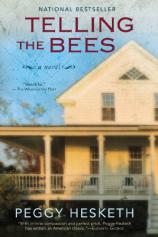Telling the Bees
Review
Telling the Bees
Albert Honig always loved everything about bees: taking care of them, their order and disciplines, their sensitive reactions to their environment. Ever since he took over the family apiary business from his father, Albert’s interaction with the outside world doesn’t extend much beyond his hives. Now in his 80s, his life follows the strictly-ordered cycles of his beloved bees. Their world and patterns make sense to him --- much more so than the complicated outside world of human interaction.
When his elderly neighbors, two unmarried sisters, are murdered in what appears to be a robbery gone wrong, the outside world seems even a harsher place to Albert. This senseless act of violence makes him look to his past and his former friendship with one of these women --- someone he hadn’t spoken to in over 10 years.
"Hesketh’s elegiac novel would be a natural for book clubs and for fans of writers like Sue Monk Kidd and Ann Patchett."
It wasn’t always this way. Growing up, Albert and his family shared a close bond to his neighbors, the Straussmans. Sure, the parents weren’t all that friendly: Mr. Straussman worked the railroad and was hardly ever home, and Mrs. Straussman was an imposing figure --- both literally and figuratively --- who suffered from diabetes. But Albert took a liking to their daughter, Claire, who was only two years older than him when they met as teenagers. Even Albert’s father’s love and knowledge of bees was passed along to their young neighbor, as it gave the girl an outlet outside her oppressive home.
Mrs. Honig took pity on Claire, sensing trouble in her home life, and encouraged her to spend time with their family, learning all she could about the life of a beekeeper, even giving her a few of her own hives to care for. Through her time spent with the Honigs, Claire caught what beekeepers call “bee fever.” In explaining her newfound passion, she relates its appeal: “It was so soft. So warm. So accepting. It moved all over and around and through my open fingers as if it was of a single, living, breathing mind that wished to know everything about me in an instant and for all of eternity, and I don’t quite know how but I felt like I was becoming a part of it.”
But after years of peaceful co-existence, something upsetting occurs, and Albert finds himself estranged from Claire and her sister, Hilda, and they never speak again. Years later, he follows a rogue swarm of bees over to the Straussmans’ house and stumbles upon the lifeless bodies of the poor old women, duct tape over their mouths, and binding their hands and feet. After calling the police, Albert tries to assist Detective Grayson with the investigation, but as a seasoned cop on the verge of retirement, Grayson suspects that there’s something Albert is keeping from him --- some vital piece of information that might help solve the case. He just has to get the man to trust him.
Peggy Hesketh’s lyrical novel takes its title from the practice of “telling the bees,” an ancient ritual in which it is “necessary to call the soul of the deceased three times by the name with which it had been born and to wish it to a happy life underground.” It also includes the quite literal “telling” the bees that their keeper has passed: “To fail to perform these rituals properly was to risk the soul’s unhappy return to the earth above.” TELLING THE BEES is less a novel about a murder and its aftermath, and more of how an event, violent or otherwise, can cause your mind to dredge up unwanted memories of the past: “Memory is a strange thing. It does not always come bidden on command. It seldom travels in a straight line.”
Albert’s world of order is turned upside down by events outside his control. And as we witness his struggle with an ever-changing world, we see that life, for better or worse, doesn’t travel in a straight line either. Hesketh’s elegiac novel would be a natural for book clubs and for fans of writers like Sue Monk Kidd and Ann Patchett.
Reviewed by Bronwyn Miller on March 15, 2013
Telling the Bees
- Publication Date: March 4, 2014
- Genres: Fiction
- Paperback: 320 pages
- Publisher: Berkley Trade
- ISBN-10: 0425264882
- ISBN-13: 9780425264881





